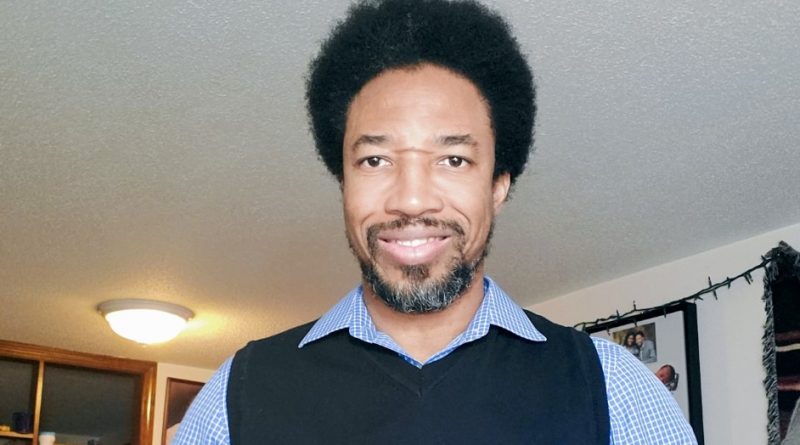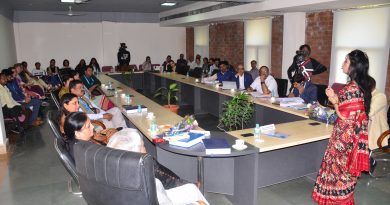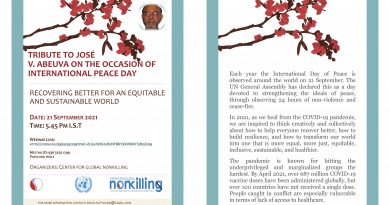The Nonkilling Paradigm and the Movement to Abolish Nuclear Weapons
Roland Joseph is a Doctoral candidate in Conflict Analysis & Resolution at Nova Southeastern University (NSU). In this interview, he explains his doctoral research on The Nonkilling Paradigm and the Movement to Abolish Nuclear Weapons.
How did you become interested in nonkilling and the movement to abolish nuclear weapons?
R.J: Nuclear weapons constitute the greatest deadly tool that humanity has ever created since they have the capacity to destroy the entire planet in the blink of an eye either by accident, miscalculation, or by the will of nuclear states. For example, in 1945, the United States dropped two atomic bombs on Hiroshima and Nagasaki in Japan killing more than 200,000 civilians. It was in this context that many peace activists around the world began to organize themselves to force nuclear countries to eliminate their nuclear arsenals.
Several decades after, the elimination of those weapons remains an important challenge for anti-nuclear-weapon activists including nonkilling scholars. My doctoral research focuses on nuclear abolition from a nonkilling paradigm. Nonkilling questions the fact of killing in its globality and at the same time seeks to present accurate alternatives for a nonkilling global society. If anti-nuclear-weapon activists believe that they can put pressure on nuclear states to reduce and eliminate their arsenals, the nonkilling scholars and leaders, however, believe in the possibility of achieving a nonkilling global society which encompasses the fact to not kill with nuclear weapons.
How is the nonkilling paradigm relevant in developing your doctoral research?
R.J: As Glenn Paige (2002) put it, a nonkilling society is “a human community, smallest to largest, local to global, in which there is no killing of humans, and no threats to kill; no weapons designed to kill humans and no justifications for using them”. My question is: how can one believe in a world without killing when such weapons have the capacity to destroy the world at any time? I seek to understand how the risks surrounding the existence of nuclear weapons influence the perception of nonkilling and anti-nuclear weapon activists towards the possibility of achieving a nonkilling global society and a world without nuclear weapons through a comparative case study using a mixed method approach.
How did you become aware of Glenn Paige’s work?
R.J: I met Dr. Paige in a conference on nonkilling held in Haiti in 2005 when the Centre Caraïbéen pour la Non-Violence Globale et le Développement Durable (CCNGD), a Haitian nonprofit organization affiliated with the Center for Global Nonkilling (CGNK), launched the French version of his seminal book Nonkilling Global Political Science. At the very beginning of this event, Professor Paige asked the same question he posed in his book to the audience: “Is a nonkilling society possible?”.
I was lucky to meet someone teaching about nonkilling in the field of political science that was also presenting evidence that a nonkilling society is possible while some professors in the institute where I completed my bachelor’s degree in political science focused on Machiavelli in The Prince, Hobbes in Leviathan, and John Locke in Two Treaties of Government and so on to justify the fact of killing.
You also served as translator of Paige’s book from French to Haitian Creole, right?
R.J: In 2009 I was part of three students translating Paige’s book Nonkilling Global Political Science from French to Haitian Creole under the supervision of Dr. Max Paul, my political anthropology professor and the founder of CCNGD who passed away in 2014. I choose to focus on nonkilling in my doctoral studies because of my experience volunteering for more than a decade in this organization by leading training in nonviolence, nonkilling, peace and conflict resolution.
When I moved to the United States in October 2013, I had quite a few conversations on the phone with Dr. Paige who encouraged me to embrace the field of peace and conflict studies. Today, thanks to his advice and the encouragement of Dr Paul at the CCNGD, I have an MA in Peace and Conflict Studies from the University of Massachusetts Lowell, and a second MS in Conflict Resolution and analysis from Nova Southeastern University.
How can CGNK continue to support nonkilling research like your own?
R.J: And I am very honored to have Dr. Balwant Bhaneja, a member of the Governing Council of CGNK and a good friend of Dr. Paige as an external member of the dissertation committee alongside my dissertation chair, Dr. Ismael Muvingi and two other members Dr. Elena Bastidas and Dr. Robin Cooper. I am also encouraged by the fact that my research on nonkilling and nuclear weapons has been well received and encouraged by CGNK, especially Dr Joam Evans Pim and Dr Katyayani Singh, particularly asboth also built their doctoral research from a nonkilling paradigm. Being a member of CGNK’s Nonkilling Security and International Relations Research Committee has also been important in terms of connecting with a larger community of nonkilling scholars.



